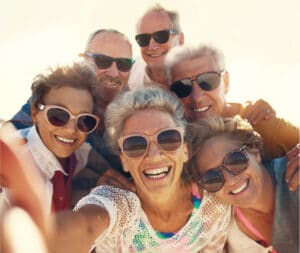Dr. Katia Taba, Board-Certified Ophthalmologist and Retinal Specialist


Ultraviolet (UV) light can harm your eyes1
Most of us remember to protect our skin by applying sunblock, but the eyes need protection as well. Too much exposure to UV light raises your risk of eye diseases and other problems. Here are a few of the eye conditions you can avoid by wearing sunglasses:1
Cataracts and eye cancers can take years to develop. Each time you bask in the sun without eye protection, you increase your risk of serious disease. Babies and children need to wear hats and sunglasses for this very reason. People of all ages should take precautions whenever they are outdoors.1
Growths on the eye, such as pterygium, can show up in our teens or 20s. Surfers, skiers, fishermen, farmers and others who spend long hours under the midday sun or near rivers, oceans and mountains are at risk.1
Snow blindness, a form of photokeratitis, can quickly develop after exposure to UV reflections off of snow, ice, sand or water.1
Protect your eyes from sun damage in every season 1
Many sunglasses shoppers forget to check the UV rating before purchasing a pair of sunglasses. Be sure to select sunglasses that provide 100% UV or UV400 protection, or block both UV-A and UV-B rays. If you’re unsure, check out our recommended types of sunglasses.
Photosensitizing drugs2
Photosensitizing drugs — drugs that make your skin more sensitive to light — can make your eyes more sensitive to light as well. You should discuss precautions with your ophthalmologist if you are taking photosensitizing drugs and wear UV-absorbent sunglasses and a hat whenever you go outside for as long as you take them. Some of the drugs that may increase your risk of UV sensitivity include:2
• Antibiotics containing fluoroquinolones and tetracyclines (including doxycycline and Cipro)
• Certain birth control and estrogen pills (such as Lovral and premarin)
• Phenothiazine (an anti-malarial)
• Psoralens (used in treating psoriasis)
• Anti-inflammatory pain relievers like ibuprofen and naproxen sodium have also been shown to cause photosensitivity, though the reaction is rare.
People with light-colored eyes2
Have blue or green eyes? Cover up with a hat and glasses to protect your vision. Some studies show that UV exposure and light irises may increase the risk of rare eye cancers, such as melanoma of the iris or uveal melanoma.2
Here are additional tips to protect your eyes from UV damage, no matter what the season:1
• Wear a hat along with your sunglasses. Broad-brimmed hats are best.
• Know that clouds don’t block UV light.
• Sunlight is strongest midday to early afternoon, at higher altitudes and when reflected off of
water, ice or snow.
• Never look directly at the sun. Doing so at any time, including during an eclipse, can damage the
eye’s retina and cause a serious injury known as solar retinopathy.
• Avoid tanning beds. Tanning beds pose the same risks to your eyes and body as outdoor UV light.
Sunlight and your health 1
Healthy exposure to sunlight can have positive effects, as long as you protect your eyes from UV damage. You need a little natural light every day to help you sleep well. That’s because the light-sensitive cells in our eyes play an important role in our body’s natural wake-sleep cycles. This is especially important as we age and become more apt to insomnia.1
Spending time outdoors in the daylight can also help prevent nearsightedness in kids. Take your children outside to play to help lower their risk for nearsightedness and teach them good habits for a lifetime of eye health. Just don’t forget those hats and sunglasses!1
If you are experiencing any changes in your eye health, whether it is blurry vision, pain, impaired vision, or any other visual irregularities, it is imperative that you see an ophthalmologist right away. The earlier disease or disorders are detected, the better the outcome and treatment options are for you.
Personalized Retina Care of Naples provides incomparable diagnosis, medical and surgical treatment for retinal and ocular conditions and disorders. Dr. Taba is a Board-Certified Ophthalmologist and is Fellowship trained in surgical and medical retinal diseases. Same day appointments are often available, and she accepts patients for second opinion.
There are ways to regain your independence and correct low vision. To find out more, or to schedule your appointment, please call (239) 325-3970 today.
Personalized Retina Care
www.retinanaples.com | 239-325-3970
3467 Pine Ridge Rd., Suite 103, Naples 34109
References:
1. D Turbert, AAO, American Academy of Ophthalmology, The Sun, UV Light and Your Eyes, San Francisco, CA 2020, https://www.aao.org/eye-health/tips-prevention/sun
2. S Dang, AAO , American Academy of Ophthalmology, People With Increased Risk of Eye Damage from UV Light, San Francisco, CA 2020, https://www.aao.org/eye-health/tips-prevention/eye-damage-from-uv-light
 Southwest Florida's Health and Wellness Magazine Health and Wellness Articles
Southwest Florida's Health and Wellness Magazine Health and Wellness Articles
